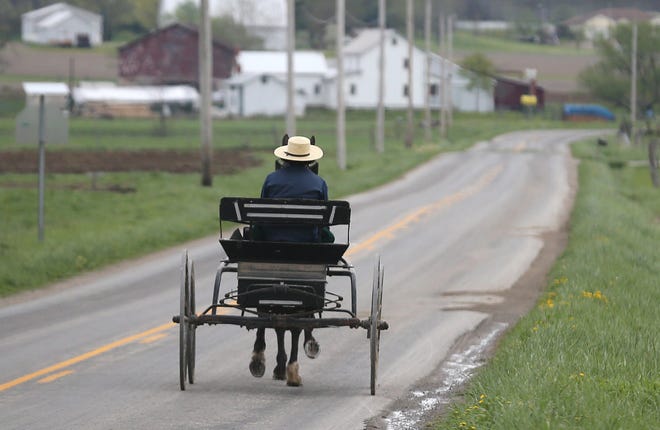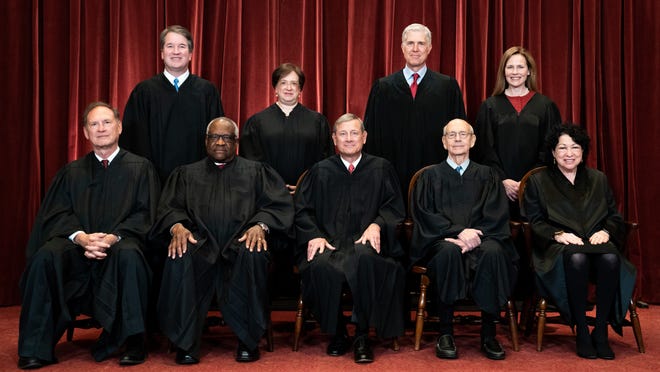- Fillmore County in 2013 began requiring that the Amish install septic systems to treat wastewater.
- They instead want to reuse water for irrigation or treat it through less sophisticated systems.
WASHINGTON – The Supreme Court on Friday sided with an Amish community that is challenging on religious grounds a Minnesota county’s requirement that its members install septic systems to treat wastewater.
The high court overturned a state court ruling that had sided with the county and asked the state’s courts to review the case again in light of its recent ruling in favor of a Catholic foster care agency in Philadelphia that refused to screen same-sex couples.
Fillmore County in 2013 began requiring that the Swartzentruber Amish, who reject modern technology as part of their religion, install septic systems to treat the wastewater from laundry, bathing and cooking – known as gray water. The Amish instead want to reuse that water for irrigation or treat it through less sophisticated systems.
In an opinion concurring with the Supreme Court’s decision, Associate Justice Neil Gorsuch said the state courts misread a federal law dealing with how such land use regulations may be applied to religious entities. It was the latest example of the Supreme Court siding with a claim of religious freedom in a contest with an asserted governmental interest.
“County officials have subjected the Amish to threats of reprisals and inspections of their homes and farms. They have attacked the sincerity of the Amish’s faith,” Gorsuch wrote. “In this country, neither the Amish nor anyone else should have to choose between their farms and their faith.”
Gorsuch said state courts should reconsider the case in light of a unanimous Supreme Court decision on June 17 that a Catholic foster care agency in Philadelphia may turn away gay and lesbian couples as clients because same-sex marriage conflicts with its religious beliefs. The high court also struck down several coronavirus regulations this year that limited attendance at churches and synagogues.
As in the Philadelphia case, Gorsuch said that the septic system law at issue in Minnesota had an exception and, because of that, courts need to heavily scrutinize a law that imposes a burden on religious organizations or activities while offering exceptions to secular ones.
“In Minnesota,” Gorsuch wrote, “those who ‘hand-carr[y]’ their gray water are allowed to discharge it onto the land directly.”
Big picture:Supreme Court ruling likely to prompt tests of religion vs. LGBTQ rights
COVID:COVID-19 cases influence battle between religion, same-sex couples
A law signed by President Bill Clinton in 2000 requires governments to tread carefully when zoning and other property regulations affect religious entities. To enforce such regulations, a government – such as a county – must have a compelling interest to do so and its rule must be as narrowly tailored as possible to serve that interest.
The Amish plaintiffs said that while Fillmore County has a general interest in ensuring wastewater is treated, it isn’t necessary on the rural farms where they live. They also said 20 other states allow gray water reuse systems in place of septic tanks. Raw sewage is not at issue because the community uses outhouses rather than toilets.
“If they are forced to choose between their beliefs and the farms that provide their livelihood, they will choose their beliefs,” a lawyer for the Amish told the justices. “That is the choice the government is forcing upon them.”
Local officials countered that they require the systems, even when raw sewage is not involved, because gray water on its own “may contain pathogens, viruses, bacteria, and other materials harmful to human health and the environment.”
The Minnesota Supreme Court declined last year to review lower state court decisions that had sided with the government in the case. Four members of the Amish community appealed to the U.S. Supreme Court in January.
Religious freedom claims have met with much success at the Supreme Court in recent years. The justices have allowed taxpayer money to be directed to religious entities in some situations, exempted employers with religious objections from requirements that they provide health insurance coverage for contraceptives and let a massive Latin cross stay on government land within a few minutes’ drive from the nation’s capital.









